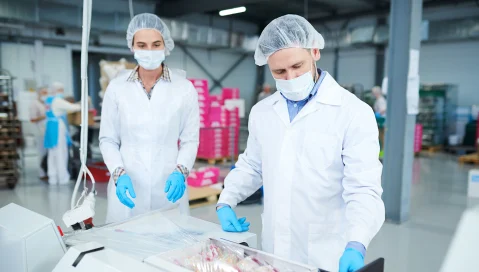3 Reasons Why Traceability in Food Manufacturing Remains Essential for Success
3 Reasons Why Traceability in Food Manufacturing Remains Essential for Success
3 Reasons Why Traceability in Food Manufacturing Remains Essential for Success
14 Juil 2022
Jack Payne
Research commissioned by Aptean, conducted by IDC and published in the Global Food and Beverage Industry Trends and Strategic Insights whitepaper confirmed that traceability remains top of mind for industry decision-makers around the world. In fact, that crucial aspect of operations was voted as the single greatest area of focus for risk mitigation, ahead of other crucial concerns like sustainability and logistics.
That being said, even if you know how critical it is to have good food traceability procedures in place at your facilities, the reasons behind them may not be quite as salient in your mind. That makes now a good time to step back, remind yourself why food traceability must be a daily priority and confirm that your systems and processes are optimized to achieve success in this function.
We’re here to add to the conversation by covering the three most compelling reasons behind the need for traceability in food manufacturing. We’ll also touch on how enterprise resource planning (ERP) can enhance your company’s effectiveness on this front and why now is the time to either jumpstart your digital transformation if you haven’t put a solution in place or re-evaluate your approach to traceability if you have already deployed a platform.
1. Complying with Government Regulations
The first steps toward codifying proper traceability practices in the food and beverage industry were taken with the creation of the Global Food Safety Initiative (GSFI) in 2000. Together with GS1, the organization established the Global Traceability Standard (GTS) to provide key insights and knowledge for organizations and industries developing long-term traceability goals.
In the following years, government agencies around the world have enacted legislation to further specify traceability requirements for food and beverage businesses in their respective regions. For example, the European Union’s General Food Law of 2002 includes Regulation (EC) No. 178/2002, which requires that companies have a comprehensive traceability system to protect consumers from the risk of contaminations in the supply chain.
The UK—still an EU member at the time of the General Food Law’s passing—still bases its own traceability requirements on those same principles post-Brexit, though it is now the responsibility of the Food Standards Agency (FSA) to enforce compliance. Meanwhile in the U.S., the Food Safety Modernization Act (FSMA) of 2011 brought with it comparable traceability standards in Section 204, which are now evolving further under the New Era of Smarter Food Safety.
The latest news on this front is the Proposed Rule for Traceability, which includes a list of 16 foods deemed by experts to pose an elevated level of risk, as well as the new concepts of Key Data Elements (KDEs) and Critical Tracking Events (CTEs). These provisions will serve to hold U.S. food and beverage companies more accountable for collecting all data pertinent to their raw materials and finished goods.
The consequences of non-compliance with these and other countries’ traceability legislation typically ranges from penalties and fines to temporary or even permanent closure. That underscores the need for food and beverage businesses like yours to have a digital solution—like an industry-specific ERP—to assist in the collection and management of traceability data, as well as a culture that encourages accountability, due diligence and thorough training.
2. Ensuring Food Safety and Recall Readiness
Traceability and food safety will always be inextricably linked, due in no small part to the fact that complete bidirectional tracking of ingredients and products is necessary to determine the source of contaminations and isolate affected items. The stats show that the industry has plenty of room for improvement on this front, with the World Health Organization indicating that nearly 10% of the planet’s roughly 7.75 billion people succumb to foodborne illnesses annually.
The effects are far worse than an upset stomach, too—420,000 die from these incidents each year, equating to a loss of 33 million healthy life years (DALYs). That makes it clear that structuring your traceability processes and systems in a way that allows you to best safeguard consumers from negative outcomes is an imperative, not only for the sake of public health but also to protect your brand reputation.
Undeclared allergens are responsible for a disproportionate number of these food safety emergencies, so you should educate your teams on the ingredients that are most problematic, take special care when using them and ensure they are segregated from other materials during shipment and storage. The U.S. Food and Drug Administration (FDA) has published a list of eight foods with the highest risk, while the UK’s FSA includes 14 allergens in their version.
You also need to put a thorough and effective recall plan in place to be completely prepared in the case of the unthinkable. First, you’ll need to gather a trained and trusted group from your internal teams to spearhead your efforts, and then you can use these steps as a starting point for your complete approach:
Alert and activate your recall team.
Determine the severity of the threat and its origin either outside or within your facilities.
Issue all necessary communications, including those to enforcement agencies.
Put a hold on outbound shipments and isolate all affected products.
Set a course of action for the withdrawal and destruction of contaminated goods.
File required paperwork to maintain total compliance with regulations.
A purpose-built ERP can help prevent food safety emergencies from occurring in the first place by giving you visibility into the path your materials take from source to factory floor and onward. That allows you to keep track of shared surfaces and identify the presence of allergens in the supply chain with which your ingredients may come into contact.
Furthermore, an advanced system like Aptean Food & Beverage ERP can streamline the recall process by automating certain steps and making the determination of a contamination’s origin much simpler with complete traceability information. Time is of the essence when issues like this do occur, so it pays to have the best possible solution in place to improve your performance in the crunch.
3. Excelling in Supply Chain Management
The disrupted state of the world’s supply chains is another subject of some discussion, with limited supplies, shipping delays, worker shortages and rising costs all contributing to create a sort of “perfect storm.” The food and beverage market is certainly not immune to the effects of these developments, which makes staying in the know about the location and movement of your materials and products all the more crucial.
Of course, that’s what traceability’s all about. When you know at a glance what’s inbound and outbound, as well as what’s being held up and why, you can prepare and make proactive changes to your ingredient purchasing and production plans. You can also let your clients know what to expect, improving the customer experience and displaying your willingness to communicate openly and honestly.
What’s more, with an ERP platform in place, you can have even more information at your fingertips, including quantities, varieties, freshness ranges and other more granular data that helps you make informed decisions. Plus, most modern solutions can integrate with handheld barcode and QR code scanners to automate the capture process, ensure accuracy and update your facts and figures in real time.
Finally, consider that there’s also increasing demand on the part of consumers for clear product and sourcing messaging from the brands that they support. Research by Label Insight showed that 94% of shoppers are more likely to be loyal to a brand that offers complete supply chain transparency, and 39% are willing to switch to brands that are more transparent.
Add it all up, and the need for a clear and accurate picture of the journey of your materials is necessary to stay on top of the flow of goods through your facilities while also keeping all parties satisfied by meeting expectations and offering excellent customer service. And with the business world growing more digital in nature all the time, a food and beverage-specific ERP is the best means to achieve those ends.
Aptean Food & Beverage ERP: The Superior Solution for Complete Traceability
In this post, we’ve focused on the traceability features of food ERPs, but if you haven’t implemented a system of any kind yet, you’ll need to evaluate the options in the marketplace and determine what the best traceability software for your company really is. There are plenty of alternatives on offer, and it will be up to you to find the best fit for your organization.
To demonstrate the appeal of ERP solutions, though, we should stress that there’s much more to love about these all-in-one platforms. In truth, they’re organization-wide interfaces for collaboration, with functions and tools dedicated to different departments and areas of operations, all developed to give businesses like yours a competitive edge.
That’s especially true of our industry-specific food and beverage solution, Aptean Food & Beverage ERP, which has been built upon the strength of decades of collective industry experience and in-depth understanding of best practices for food and beverage companies. We’ve also created a full suite of modules to suit the unique challenges that highly specialized operations need, like catch weight management for meat and seafood providers and consignment tracking for fresh produce growers.
Additionally, we offer our award-winning software on a SaaS model with cloud hosting, giving you the flexibility to select a lightweight deployment method with lower up-front costs, greater security and 99.9% uptime. Plus, our system leverages robust, unique and industry-specific technology built on an underlying Microsoft Dynamics 365 Business Central platform, lending it familiarity and a user-friendly interface.
So, ready to hear more about Aptean Food & Beverage ERP and how it can improve your company’s approach to traceability in food manufacturing? Reach out to us today, or request a personalized demo.
Optimisez dès aujourd'hui la traçabilité de vos opérations
Vous souhaitez faire passer vos activités d'alimentation et de boissons au niveau supérieur ? Vous pouvez compter sur nous.



